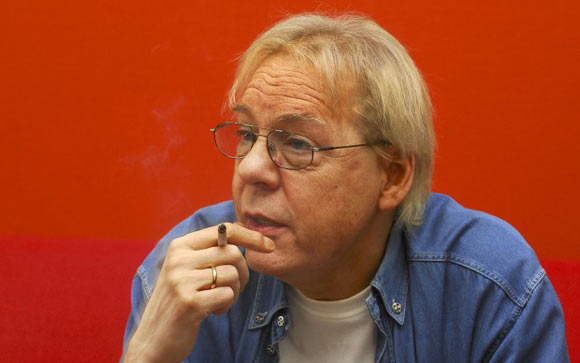
Klaus Schulze is a German electronic music composer who is widely known for his spectacular solo career. Schulze, who was also known by the alias ‘Richard Wahnfried’ for a time, was part of the bands ‘Tangerine Dreams’ and ‘Ash Ra Tempel’, after which he embarked upon his solo career.
Schulze played for many bands on and off for much of the 1960’s before finally settling with ‘Tangerine Dream’ in 1969. As a drummer and composing artist, Klaus was an integral part of the band’s debut album, “Electronic Meditation”. Schulze then went on to become a co-founder of the band “Ash Ra Tempel” with Hartmut Enke and Manuel Göttsching in 1970, with whom he released their debut self-titled album. However, in 1971, Schulze opted out of the band in favor of a solo career. Schulze still featured in two of the band’s reunion concerts, one in 1973, and the other in 2000.
Schulze wet on to make a name as a promising electronic musician, his debut solo album, titled “Irrlicht (1972)” was considered an extraordinary work considering the fact that it was recorded with an orchestra and composed without a synthesizer. Since then, Schulze has been extremely prolific. Schulze’s next work was ‘Cyborg’, for which he used the ‘EMS Synthi A’ Synthesizer. Schulze’s notable albums from the 1970s include the 1975 ‘Timewind’, which went on to win the Grand Prix du Disque (Grand Prize for Records) by the L’Academie Charles Cros; the 1976 album ‘Moondawn’, which was Schulze’s first album to be performed in the Berlin School Style; and the 1979 album ‘Dune’, which included performances from Arthur Brown.
The 1980s were marked by a heavy reliance on digital instruments and sequencers. Notable albums from the 1980s include ‘Dig it’ from 1980, ‘Trancefer’ from 1981, which was noted for its remarkable use of percussion instruments and the cello. Two other Schulze albums from the 1980s are also remembered as some of his best, these include ‘Miditerranean Pads’ and “En-Trance”. Schulze also released his first live album in 1983, which he recorded in Poland.
The 1990s was marked by experimentation and exploration. Schulze extensively used ‘samples’ in his records, which were previously recorded sounds of expressive sentiments such as screeching birds and intimate sounds. Schulze’s use of sampling started with his 1991 album ‘Beyond Recall’ and it heavily died down with his 1995 album “In Blue”.
Schulze released plenty of albums under the alias ‘Richard Wahnfried’. Many critics state that Schulze’s adoption of the alias is a sign of his great affection for Richard Wagner’s music (Wahnfried is the name of the villa where Wagner is buried). Between 1979 and 1997, Schulze released seven albums under the alias, and they were all categorized by a shift towards more mainstream music genres, including rock, techno, trance and dance. His 1996 album ‘Trance Appeal’ was arguably his best album under the Wahnfried alias. Schulze is also a great admirer of legendary psychedelic rock group Pink Floyd. Between 1994 and 2008, he released twelve records that bore titles that were inspired by the names Pink Floyd used for their songs, the series is known as the “Dark Side of the Moog”.
Klaus Schulze has released over sixty albums over his illustrious career. Two of his albums, ‘Mirage’ and ‘Timewind’, have been included in the list of ‘25 Most Influential Ambient Albums of All Time’.